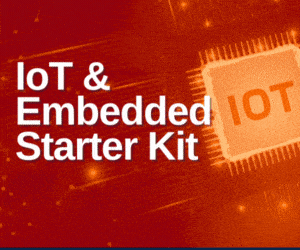In India, the undoubted need of the hour is to implement cost-effective healthcare solutions that can even reach the poorest in the most remote areas of the country. Researchers believe that one way to achieve this vision would be through the Internet of Things (IoT) and Smart Sensors that are now slowly taking strides towards adaption within the Indian Medical fraternity.
To understand more on the role of IoT in revolutionising healthcare in India and thereby making treatments affordable to the masses, Rahul R of Electronics For You spoke to Jagdish Harsh, CMD, Mobiloitte who offered deep insights not only on IoT in healthcare but also on a related concept called Smart Beds.
Q. First things first, how would IoT revolutionise healthcare in India according to you? 
A. Healthcare is undergoing a major revolution with a larger ecosystem involving tech giants, smart device manufactures, analysts, and data scientists.
Healthcare is going to depend on the connected devices that connects all the elements and in turn creates a stronger healthcare pool. This concept is also called ‘System of Systems’ backing IoT.
Not only patients and doctors, but more and more people also getting connected to these devices by using smart wearables to indulge in activities such as keep track on their health, along with work.
Empowering the masses to keep track of their fitness level and health issues, along with smartly offering insights on how to take care of health results in enhancing longevity of life.
Q. Can you throw some light on the smart beds concept that have been introduced by some hospitals in certain countries of the world?
A. Nowadays, we can see a number of connected medical devices such as ultrasounds, thermometers, glucose monitors, electrocardiograms, and more; to backtrack patient’s health. Doctors, along with patients have been found to be benefiting from these IoT-driven connected devices.
This revolution has started in the healthcare sector and numerous hospitals have introduced smart beds and are efficiently utilizing them.
Smart beds are equipped with smart sensors that monitor medical conditions, time of check-ups, along with performing multiple tests to track the real time condition of patients.
This transforms not only patient’s life, but also reduces the burden on doctors by supplying them with essential information as and when required efficiently.
In lots of cases, smart beds upload info that can be accessed by doctors even at remote locations. This information can then be used by Doctors to monitor patients’ health. Medication required by patients can also be determined smartly.
Finally, behavioural changes in patients is also detected dynamically, and then passed on to Doctors.
Q. Can you illustrate the concept of Smart Beds with case studies?
A. Absolutely, in Ontario, Canada, at the Mackenzie Vaughan Hospital there is an information, communication and automation technology (ICAT) strategy under which several innovations aimed at integrating innovative technology in patient care have been launched.
This led to the creation of a first-of-its-kind innovation unit in Canada in 2014 – a 34-bed ‘living laboratory’ where innovative medical ideas are tested and evaluated before being implemented across the hospital.
Living Laboratory, here, includes smart beds and other technology-enabled clinical tools, pervasive computing (utilising computers embedded in everyday objects to communicate information) and ambient intelligence (electronic environments that are sensitive and responsive to the presence of people).
Q. Smart Beds sounds interesting; in sync with this, what would be the cost of adapting IoT in health care in hospitals in India?
A. According to the India Brand Equity Foundation (IBEF), by 2020 the number of connected devices in health care will be more than 30% of the total connected devices.
Boosting this is the fact that the cost of related technologies has come down manifold. Healthcare cost in US is close to 18% of the total GDP and more than 50% is state sponsored and it is going to cost near $40 trillion by 2050 because of increase in chronic disease.
As per the Ministry of Health in India, development of 50 technologies has been targeted in the FY16, for the treatment of disease like Cancer and TB. 100% FDI is allowed under the automatic route for Greenfield projects.
For Brownfield project investments, up to 100% FDI is permitted under the government route.
Q.In India, do you have any apprehensions about world class treatment via connected devices (driven by IoT) being confined only to the elite?
A. Data generated with the help of devices or smart hospital beds needs to be communicated and analysed for more effective action. Here, the sensors, connected devices, and other things in healthcare IoT will gradually get cheap.
For instance, portable machines used for monitoring of certain patient types used to cost as much as $1,000 (Rs 65000), but recently, patients can buy individual devices for atrial fibrillation for just $75 (Rs 5000).
Subscriptions to cardiac monitoring services can use this lower-cost collection of data by allowing frequent notification in case of an emergency. In other words, we can often increase one technology’s created value by integrating it in a more adaptive environment.
In the long run, IoT will help to make healthcare facilities affordable for everyone, not restricting to elite class only.
Finally, healthcare IoT and smart concepts would also take medical treatments to the home, from the hospital. This should gradually bring down costs and thereby help the masses.
Q. Finally, what have been the most innovative IoT-surgery concepts that have surfaced in recent times?
A. The most important of these is listed below:
- Bodytrak – Users can measure, in real time,the vitals such as body temperature, heart rate, VO2, speed, distance, and cadence. Bodytrak also measures the biometric information from the ears; this lets users listen to music and make telephone calls as well.
- Motiv – This stylish and elegant ring behaves like a step counter, heart rate monitor or sleep tracker, the major advantage being – it is element resistant (water, ice, etc.).
- Aria – Aria agents monitor realtime scenario of the physically challenged through smart glasses or a phone camera, and talk them through the situation – making it a easy to cross the street, or finding a switch.
- QardioCore – This wearable lets you share clinically accurate continuous ECG, heart rate, heart rate variability, respiratory rate, skin temperature, and activity data with medical professionals. You can also sync to the free Qardio app or Apple’s Health app on iPhone or iPad.
- Neogia – Neogia’s wearable, MOTIO HW detects sleep apnoea and improves the overall quality of sleep via a personalized artificial intelligence system that learns about the user.
All of these health innovations concepts were showcased at this year’s Consumer Electronics Show (CES 2017).






